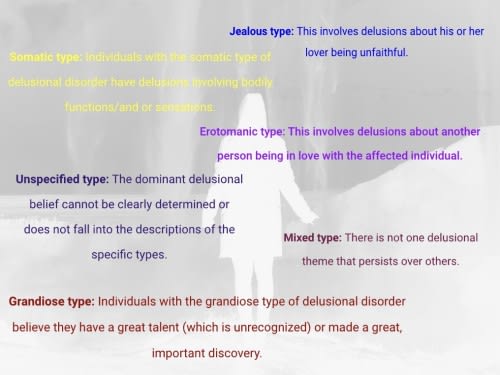Delusional Disorder

posted 22nd September 2022
What is Delusional Disorder?
According to the Diagnostic and Statistical Manual of Mental Disorders, Fifth Edition, the essential feature of delusional disorder is the occurrence of one or more delusions that continue for at least a month. These delusions can lead to social and occupational problems, as others begin to see these individuals as irrational.
It’s critical that assessments of depression, cognition, and mania symptoms are thoroughly completed in order to correctly distinguish delusional disorder from other psychotic disorders, including the various schizophrenia spectrum.
Diagnosing Delusional Disorder
While the essential feature of this disorder is simply the existence of one or more delusions that occur for at least 1 month, there are other mental health illnesses that can cause delusions such as schizophrenia that would need to be ruled out before an accurate diagnosis can be reached.
Treatment for Delusional Disorder
While delusional disorder can be a difficult one to treat, affected individuals do have a few options:
- Psychotherapy: This is typically the most effective treatment for individuals suffering from delusional disorder. The therapist will avoid directly challenging the delusional beliefs and instead concentrate on realistic problems and goals the person has. Then, when a solid relationship has been established between therapist and patient, the therapist can start reinforcing positive behaviours of the individual.
- Medications: Anti-psychotic medication is the most common form used to treat delusional disorder. However, this treatment approach can be problematic as patients may become suspicious of professionals suggesting the use of medication.
Subtypes of delusional themes:
- Erotomanic type: This involves delusions about another person being in love with the affected individual.
- Grandiose type: Individuals with the grandiose type of delusional disorder believe they have a great talent (which is unrecognised) or made a great, important discovery.
- Jealous type: This involves delusions about his or her lover being unfaithful.
- Persecutory type: This subtype pertains to individuals with delusions involving their beliefs that they are being conspired against, spied or cheated on, poisoned or drugged, harassed or followed, or generally obstructed in the pursuit of long-term goals.
- Somatic type: Individuals with the somatic type of delusional disorder have delusions involving bodily functions/and or sensations.
- Mixed type: There is not one delusional theme that persists over others.
- Unspecified type: The dominant delusional belief cannot be clearly determined or does not fall into the descriptions of the specific types.
What is an example of delusional disorder?
Jealous delusional thinking: People with this type of delusional disorder believe that their spouse or sexual partner is unfaithful without any concrete evidence.
Delusions are often reinforced by the misinterpretation of events. Many also involve some level of paranoia. For example, someone who is delusional might contend that the government is controlling our every move via radio waves, even with no evidence to support this belief.
For more information on how psychotherapy can help treat delusional thinking click here:
Reference:
American Psychiatric Association. (2013). Diagnostic and statistical manual of mental disorders (5th ed.).



